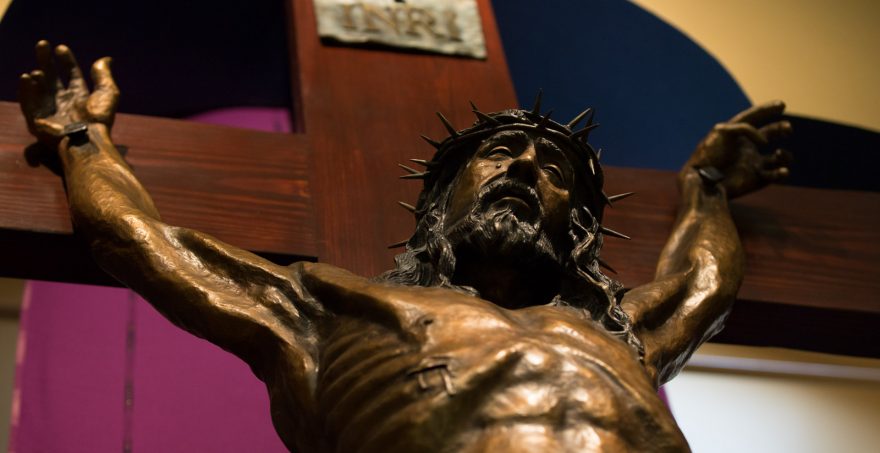The Stations of Your Cross
by Soren & Ever Johnson

What are the stations of your cross?
At first glance, this question seems provocative—and possibly even irreverent. After all, as we enter Holy Week, how can the cross we are carrying even begin to compare with the cross of our Lord and Savior, Jesus Christ?
In plain terms, it can’t. We will almost certainly never be condemned to long, torturous, public suffering and martyrdom. And we definitely won’t bear the weight of all sins. And yet, Jesus himself tells us, “Take up your cross and follow me.” If our Lord compares our crosses to his, perhaps we should look at the similarities more carefully.
Long tradition tells us that meditating on the Lord’s passion is the surest path to holiness. St. Bonaventure said, “He who desires to go on advancing from virtue to virtue…should meditate continually on the Passion of Jesus.” Many are the saints who have said something similar. So, later this week, at Good Friday Stations, we’ll have an excellent opportunity to advance in holiness.
“The Stations of the Cross,” a Catholic News Agency story summarizes, “are a way to pray and meditate on Christ’s sacrifice for us. It is divided into fourteen stations from when He was condemned to his burial. The Church has long encouraged this devotion, and it is especially useful during Lent and Good Friday.”
But the formal Stations of the Cross aren’t something that most of us find time to do regularly. If meditating on the passion of Jesus is the surest path to holiness, it seems we should do much more of the Stations. But how will we fit another regular practice into our long days of serving our family and community?
It is in our relationship with Jesus—specifically with the total, sacrificial love of his passion and death—that we are molded into persons who are worthy to be called children of God. It is in linking our crosses to his that we join with the body of Christ. It is in watching us cultivate this relationship that our spouse, children, and neighbors learn how to join God’s family.
Thankfully, putting aside the formal practice of the Stations, our daily lives give us ample opportunity to experience the power of this relational molding on our personal way of the cross. Yes, if we are responsible adults striving to care for our loved ones and contribute to our community, our average day is filled with challenging stations.
Many of us begin our daily way of the cross with the early-morning alarm. And then, we may move on to the station of waking the kids and helping them dress, or making breakfast for the family before beginning a long commute. Perhaps we suffer from an illness, a vexing set of issues surrounding our children’s education, an enervating meeting with a co-worker, or a stressful project deadline. With our backs against the wall, we often feel we have nothing left to give, and we want to turn away from the cross and find solace elsewhere.
Of course, there are many days when we feel well and even mundane tasks are enjoyable. And many are the joys and lighter moments of family life! But every striving Christian knows that in this valley of tears, some form of suffering won’t be far behind and that the path to true happiness is to unite our pain with the cross and find the sweetness of union with Jesus’ love. It turns out that, when we understand our average day as a series of stations, the powerfully-transformative Passion of Christ is never far from our thoughts.
As we consider how Jesus’ suffering and death can bring holiness from our everyday struggles, let’s allow our personal stations to bring us daily to our Lord’s side on Good Friday. Then, we can enjoy his love up close while we do our part to help redeem humankind. We invite you to join us in taking questions like these to prayer this Holy Week (and beyond):
- What does my cross look like at this current moment?
- Am I running from this cross, accepting it grudgingly, or embracing it with love and humility?
- Am I inviting Jesus to carry this cross with me?
What if, instead of just hovering around the edges of the stations of our cross in our home and daily life, we truly approached them with the self-gift, the self-emptying, and the single-minded focus of Jesus Christ?
“We adore you O Christ and we praise you,” we will hear a priest or deacon say if we participate in the Stations of the Cross this week. This Holy Week and beyond, may we respond with our whole hearts: “Because by your holy Cross, you have redeemed the world!”





